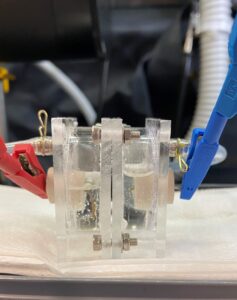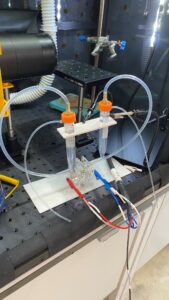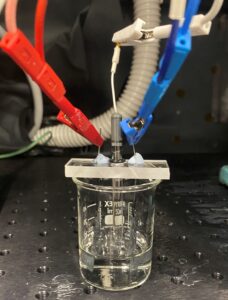Meet Alex Knowles, a UCC undergraduate in Forensic Science from the School of Chemistry, whose passion for sustainable energy led him to work on the FreeHydroCells project. In this interview, Alex shares his journey, from studying forensic science to researching solar-powered hydrogen production, and his future ambitions in the field of chemistry.
Hi Alex. Tell us a little bit about your background and interests.
I am originally from Cork and so there wasn’t much debate of where I was going to be undergoing my third level education, other than at UCC. I am currently studying for my undergraduate degree in Chemistry with Forensic Science. I’ve always had an interest in pursuing a degree with forensics at its core and was fortunate enough that this course was available right at my doorstep. Throughout my time in this course, I have acquired a wide scope of knowledge in chemistry, as well as in molecular biology, toxicology, and genetics. A huge emphasis is placed on analytical chemistry in this degree, and because of this I’ve had the opportunity to engage in various hands-on experiments and laboratory work. These experiences have not only deepened my understanding of scientific principles but have also sharpened my practical skills, preparing me for real-world applications in chemical analysis.

Chemistry with Forensic Science is an interdisciplinary course, with huge focus on analytical chemistry. We are taught a unique blend of forensic science, including forensic psychology, forensic pathology, and legal medicine, along with the fundamentals of chemistry, such as pharmaceutical chemistry, quantum mechanics and electrochemistry. In addition to learning theoretical concepts, we also delve into practical aspects of analytical chemistry, engaging in labs to develop our skills in chromatography and spectroscopy.
Are there aspects you particularly enjoy?
I have particularly enjoyed the lab components of my course. These ranged from organic and inorganic labs, to simulated crime scenes and trace analysis. The college has done a great job at relating what is learned in lectures to what is carried out in labs, as well as preparing us for the world of industry.

Can you tell us about your final year project?
My final year project is titled ‘Using Solar Power to Split Water as a Source of Green Hydrogen’. It focuses on investigating n-type and p-type silicon electrodes and their potential usage in the production of sustainable hydrogen, as well as their potential place in the Hydrogen Economy. Utilizing standard electrochemical methods alongside simulated solar irradiation, including cyclic voltammetry, linear sweep voltammetry, and electrochemical impedance spectroscopy, we examined the performance and efficiencies of these electrodes, using platinum film as a comparison (which have no solar irradiation response).
Can you tell us how you became involved in the FreeHydroCells project?
Dr. Dara Fitzpatrick is my academic supervisor for my final year project, and it was his idea to carry out my project, along with his own work, in association with FreeHydroCells. He had set up a few meetings for me with Dr Ailbe Ó Manacháin and Dr. Ievgen Nedrygailov, and the work began from there!
How would you asses your contribution to FreeHydroCells, and did you learn anything new from the experience?

I definitely learned a lot more than I thought I would. I had learned a lot of the theory that this project is based around, such as semiconductors and electrochemistry, in lectures, but it was only when researching these topics myself and carrying out practical experiments that I began to really feel like I knew what I was talking about. I think this knowledge and refined understanding is definitely going to come in handy when exams come around.
Did you have any memorable or challenging experiences during your research?
I think the most challenging aspect of my research was refining the design of my electrolyser. Initially when designing it, we planned to be able to incorporate Broadband Acoustic Resonance Dissolution Spectroscopy (BARDS) into the system so we put a lot of time into coming up with ways it would work, but due to time constraints and impending deadlines, we had to continue without it and focus on what preliminary integration steps would be needed. Since we weren’t going to be incorporating BARDS, our setup became more focused on the electrochemical setup needs for a future BARDS integration, but I don’t think that time spent was wasted at all, it was all part of the process of integration, which has not been attempted prior to FreeHydroCells.

Have you achieved any significant results or conclusions from the research?
Our most significant result obtained was to do with the difference in photocurrent generated by the n-type silicon compared to the p-type. We determined that there was a 30-fold increase in efficiency of hydrogen production for n-type silicon compared to p-type, showing that the use of these silicon semiconductors as photocatalysts is a potentially promising route towards sustainable hydrogen production.
What’s next for Alex? Do you have plans in mind for the future?
Final year exams are right around the corner, so most of my time has been devoted to studying. My main plan for the future is to carry out my masters in the Analysis of Pharmaceutical Compounds at UCC, where I’m looking at hopefully carrying out my industry placement and research project in The Netherlands. After that I’m really not sure! Juggling between the options of going into industry or looking at PhDs is definitely something I’m going to have to put a lot more thought into over the next year.

